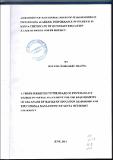Assessment of managerial roles of stakeholders in influencing academic performance of students in Kenya Certificate of Secondary Education ; a case of Imenti North District.

View/
Date
2011-06Author
Nkatha, Mutuma Margaret
Type
ThesisLanguage
enMetadata
Show full item recordAbstract
Students in Kenya's secondary schools take four years to prepare for higher education. Most students start to shape their future in pursuing subjects that will take them to their careers at this level. Secondary education has been characterized by relatively poor performance in national examinations, especially in the core subjects, such as mathematics and sciences in Imenti North District (Eastern Province). There are many managerial factors interacting with each other to bring about this scenario. The main objective of the study was to assess the importance of managerial roles of stakeholders in influencing academic performance of students in KCSE in Imenti North District - Kenya. Descriptive survey research was employed where 20 public secondary schools were sampled using purposive sampling. 260 Board of Governors members, 20 headteachers, 109 teachers, 400 parents and 200 students in selected schools were used as respondents. A pilot study was carried out in one school outside the Imenti North District which was not included in the actual study in order to establish the reliability of the research instrument and also to find out whether the wording was clear. Data collection was done by use of questionnaires. Statistical Package for Social Sciences (SPSS) was used to analyse the data. The findings of the researcher were; most schools faced the problems of limited funds, poverty, BOG members lacked frequent capacity building seminars, schools lacked adequate physical facilities to facilitate proper learning, teachers handled many students in a class, parents do not give full support to their schools and students do not work hard. There was also inadequate school inspection and _ auditing and the problem of understaffing in most schools. The recommendations of the researcher were; that Board of Governors in public secondary schools require frequent capacity building seminars on management of schools, that headteachers and teachers need to work as a team, that parents need to give more support to their schools, that students need to work hard, that the government require to remit more funds to secondary schools, post more teachers to understaffed schools, and as much as possible avoid involvement of politicians in BOG nominations and that the Ministry of Education need to intensify school inspection and auditing exercises. The information from this research can be used by school managers, researchers and the Ministry of Education to chart ways of improving KCSE results and not only in Imenti North District but also in Kenya.
Publisher
KeMU
